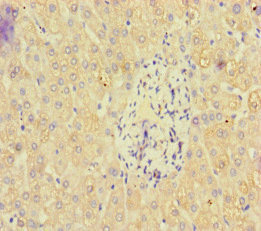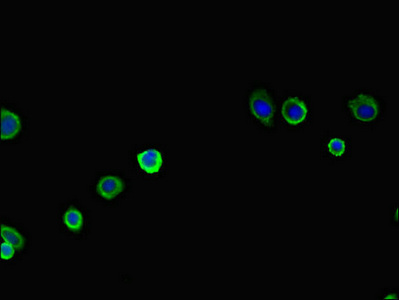
Immunohistochemistry of paraffin-embedded human liver tissue using CSB-PA681391LA01HU at dilution of 1:100
PAN2 Antibody
CSB-PA681391LA01HU
ApplicationsImmunoFluorescence, ELISA, ImmunoHistoChemistry
Product group Antibodies
ReactivityHuman
TargetPAN2
Overview
- SupplierCusabio
- Product NamePAN2 Antibody
- Delivery Days Customer20
- ApplicationsImmunoFluorescence, ELISA, ImmunoHistoChemistry
- CertificationResearch Use Only
- ClonalityPolyclonal
- ConjugateUnconjugated
- Gene ID9924
- Target namePAN2
- Target descriptionpoly(A) specific ribonuclease subunit PAN2
- Target synonymsUSP52, PAN2-PAN3 deadenylation complex catalytic subunit PAN2, PAB-dependent poly(A)-specific ribonuclease subunit 2, PAB-dependent poly(A)-specific ribonuclease subunit PAN2, PAB1P-dependent poly(A)-nuclease, PAB1P-dependent poly(A)-specific ribonuclease, PABP-dependent poly(A) nuclease 2, PAN deadenylation complex catalytic subunit 2, PAN deadenylation complex subunit 2, PAN2 poly(A) specific ribonuclease subunit homolog, inactive ubiquitin carboxyl-terminal hydrolase 52, poly(A)-nuclease deadenylation complex subunit 2, ubiquitin specific peptidase 52, ubiquitin specific protease 52
- HostRabbit
- IsotypeIgG
- Protein IDQ504Q3
- Protein NamePAN2-PAN3 deadenylation complex catalytic subunit PAN2
- Scientific DescriptionCatalytic subunit of the poly(A)-nuclease (PAN) deadenylation complex, one of two cytoplasmic mRNA deadenylases involved in general and miRNA-mediated mRNA turnover. PAN specifically shortens poly(A) tails of RNA when the poly(A) stretch is bound by poly(A)-binding protein (PABP), which is followed by rapid degradation of the shortened mRNA tails by the CCR4-NOT complex. Deadenylated mRNAs are then degraded by two alternative mechanisms, namely exosome-mediated 3-5 exonucleolytic degradation, or deadenlyation-dependent mRNA decaping and subsequent 5-3 exonucleolytic degradation by XRN1.
- ReactivityHuman
- Storage Instruction-20°C or -80°C
- UNSPSC41116161




